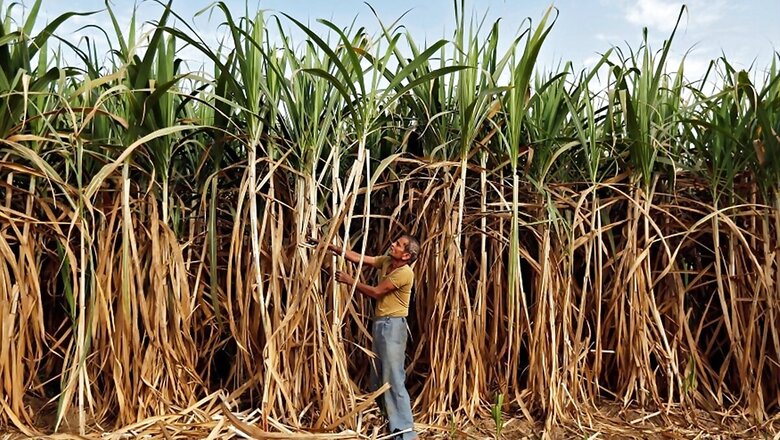
views
A Niti Aayog task force has recommended linking sugarcane prices to sugar rates to keep the industry in sound financial health. It has also pitched for a one-time increase in minimum sugar price to Rs 33 per kilo to help sugar mills cover the cost of production.
The report of the panel on 'Sugarcane and Sugar Industry', headed by Niti Aayog Member (Agriculture) Ramesh Chand, was finalised in March 2020. It was posted on the government think-tank's website on Thursday.
The task force also recommended shifting of some areas under sugarcane cultivation to less water-intensive crops by providing suitable incentive to farmers.
"The task force feels that to prevent the problem of arrears for sugarcane farmers and to keep the sugar industry in sound financial health, sugarcane prices must be linked to sugar prices.
"The Revenue Sharing Formula (RSF) needs to be introduced, with a Price Stabilisation Fund to protect farmers from receiving prices below the Fair and Remunerative Price (FRP). While the scientific formula suggested by the Rangarajan Committee could be considered, the prices of sugarcane may need to be adjusted slightly upwards keeping in view the improvement in recovery rates in the last few years," the report said.
The task force recommended a one-time increase in minimum sugar price to Rs 33 per kilo, saying it would help sugar mills to cover the cost of production, including interest and maintenance costs.
"Keeping in view the emerging developments, the MSP for sugar should be reviewed after six months of the notification," it said.
The task force further said the government should target moving about 3 lakh hectares area under sugarcane, which yields about 20 lakh tonnes of the crop, to other crops.
"The task force feels that a compensation of Rs 6,000 per hectare could be given as additional incentive to farmers for alternate cultivation patterns that are less water intensive than sugarcane," it said.
The task force noted that due to stagnation and/or declining sugar prices, the liquidity position of the mills has remained a major cause for concern, prompting the government to come out with various liquidity support measures from time to time.
"The task force recommends a long-term solution that requires fund of a reasonable size to provide liquidity support to the mills if such situations emerge.
"It is proposed to levy cess on sugar at Rs 50 per quintal for a period of 3 years, during which about Rs 4,500 crore would be added to the fund, which will help provide bridge funding or act as a comfort for banks providing soft loans to mills for improving technologies and paying dues to their farmers," the panel said.
Sugarcane and sugar play significant role in the economy of India. Sugar is the country's second largest agro-based industry, next to cotton.
Average annual production of sugarcane is around 35.5 crore tonnes which is used to produce around 3 crore tonnes of sugar. The domestic consumption is estimated to be around 2.6 crore tonnes in the current financial year.




















Comments
0 comment